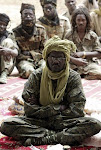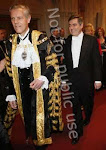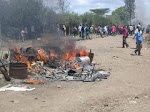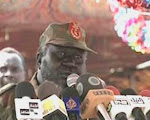"The will of the people and free and fair elections are more powerful than any state machine, notwithstanding its strength and severity… undemocratic regimes cannot stop the realization of the people’s will and the basic rights." - Georgian President Mikheil Saakashvili and Ukrainian President Victor Yushchenko – http://usinfo.state.gov/dd/eng_democracy_dialogues/elections/elections_speech_excerpts.html
In the previous features, "Integral" discussed the lack of democratic principles in South Sudan and how such disunite the people of South Sudan. It observed the values or pillars of democracy: sovereignty of the people; government based upon consent of the governed; majority rule; minority rights; guarantee of basic human rights; free and fair elections; equality before the law; due process of law; constitutional limits on government; social, economic, and political pluralism; values of tolerance, pragmatism, cooperation, and compromise, http://usinfo.state.gov/products/pubs/whatsdem/whatdm2.htm.
It promised to examine each one of these pillars. It has already examined "sovereignty of the people"; "government based upon consent of the governed"; "majority rule"; and "Minority rights". Today, "Integral" will be looking at "free and fair elections" and its importance as stipulated in the Interim Constitution of South Sudan (ICSS) in Part II Bill of Rights; "Equality before the Law", article 18, which states that "all persons are equal before the law and are entitled to the equal protection of the law without discrimination as to race, ethnic origin, colour, sex, language, religious creed, political opinion, birth, locality or social status. For more information on ICSS, visit: http://www.chr.up.ac.za/undp/domestic/docs/c_SouthernSudan.pdf. Those willing to follow the "Integral" column right from its onset should visit http://ohiyok-newsanalysesonline.blogspot.com/.
Free, fair and elections are three words that have to be defined each separately to benefit some sections of "Integral" readership, especially the students. Free has two meanings. The first one means gratis. The second one means at liberty. Fair means unbiased and/or reasonable. Election means choosing by vote. In "Integral" context, therefore, free and fair elections could be rephrased as 'choosing by vote conducted at liberty and without bias.'
As one of the democratic pillars or values, free and fair election is perhaps the epicenter of democracy itself. There are many countries around the world that claim to be democratic or use election to demonstrate to the world that they do practice democracy. Democracy may be a word familiar to most, but it is a concept still misunderstood and misused in a time when totalitarian regimes and military dictatorships alike have attempted to claim popular support by pinning democratic labels upon themselves http://usinfo.state.gov/products/pubs/whatsdem/whatdm2.htm.
True democracy, however, is exercised by governments that give credit and trust to their own citizens – governments that are resolved that the sovereignty of their nations is vested in their citizens. These governments, directed by the constitution of their nations, give their citizens the right to pass verdicts on them in the way they manage their affairs. Governments like these organise elections in such a way that the citizen of their nations decide – in a freewill – to vote men and women of their choices to parliaments, senates, presidencies, and indeed any other public offices.
Government of South Sudan (GoSS) has stipulated in ICSS Part I, Chapter I, 2 (1) Sovereign Authority of the People of Southern Sudan, that "without prejudice to Article 2 of the Interim National Constitution, sovereign authority in Southern Sudan is vested in the people and shall be exercised through their democratic and representative institutions established by this Constitution and elected by them in regular, free and fair elections. (2) The authority of government at all levels in Southern Sudan shall derive from the people and shall be exercised in accordance with their will, this Constitution and the law.
To relate free and fair elections to the concept of "Integral" column, "disunity in South Sudan", it is important to note that the non-observance of free and fair elections has brought about disunity in many parts of the globe. Therefore, as part of that globe, "Integral" is fully aware that GoSS has not conducted any elections. But it will sooner or later. This being the case, it is important that GoSS and the ruling party, Sudan People's Liberation Movement (SPLM), understand that non-observance of free and fair elections in South Sudan – in the near or far future – may not differentiate South Sudan from the dictatorial democracies around the globe. Kenya, Uganda and Zimbabwe offer good examples of how non-observance of free and fair elections caused disunity amongst the peoples of these countries. For the purpose of this feature, "Integral" will only highlight on the Kenyan presidential elections, as an example.
In Kenya, there were reports of wide rigging of votes and the quick swearing-in of President Mwai Kibaki was a testimony to this. How? Because the concept of free and fair elections cannot become practical unless the government in power ensures that the peoples' choice is the verdict needed to bring about a political change. The opposition could not have cried fowl if its observers had seen free and fair voting exercised. They did not see it and so they had to declare that the elections were not free and fair. The government refused to listen to them and instead rushed to swear-in the opponent of the opposition. The opposition leader was supposed to concede defeat and attend the swearing-in ceremony of his worthy opponent but he did not. This did not only cause disunity in Kenya but thousands of lives were lost.
In South Sudan there are very serious trends insinuating elections rigging in future. This statement may be misunderstood by fellow brothers and sisters in both GoSS and the SPLM for an unfounded accusation. But it is a fact that many members of the SPLM and Sudan People's Liberation Army (SPLA) have been and continue to say GoSS came through a gun; and that they will not allow anybody to take it by a ballot box. Others are making strategies of having members of their ethnic and/or nationality groups elected from occupied territories within South Sudan.
Those who say that GoSS came through a gun; and that they will not allow anybody to take it by a ballot box are openly saying that there will be no elections. But should elections be sanctioned by all means, then elections will be rigged in order to maintain the status-quo with a view to enjoying what has been earned through the gun, GoSS.
Meanwhile, the strategy of illegally settling people in some parts of South Sudan amounts to a planned future neo rigging of elections. Since numbers decide in elections who lead, any of these settlers could be simply elected by his/her ethnic and/or nationality group illegally settled in an area where they become more than half of the original population. More than half of the population gives anybody a clear win and as such democracy, according to those who are selfish, could have spoken.
Why should anyone in his/her normal mind for example think that s/he as an Equatorian from Otuho nationality in Torit could move part of his/her clan to Bor and expect to win elections and represent the people of Bor? Why can't this Otuhoni relocate to Bor through legal means and seek for support of the people of Bor? How does someone expect to become popular in his/her own tribe and village and thinks that s/he could use such across the boundaries of his/her village? Does tribal leadership improve the chances of a tribal leader to become a national leader?
It is not possible for anyone to move his/her clan and expect to become popular in a territory in which s/he is regarded a squatter. S/he who imposes himself or herself on the people, including his/her own tribe, may not enjoy leadership no matter where s/he settles.
However, it is possible for someone to easily become popular in his/her own village and uses that across the boundaries. There are two things that would make this cross boundaries popularity possible: one, the use of tribal affiliation to promote the general good of mankind; and two, the need to acquire qualities that do not divide people on the basis of tribe, religion, creed, race and/or gender.
Tribal leadership does not improve the chances of a tribal leader, especially one who is addicted to his tribe and tries to use anything in his/her powers; be it public or otherwise to promote tribal interest. Leaders like this cannot go an inch from their villages. Even in their states chances of their political survival are limited unless of course the said state is made up of one tribe. Should that be the case, then clanism may be used to promote the interest of that clan. Leaders like this would continue deteriorating until they disappear in tribal chieftaincies.
South Sudan is made up of about 63 nationalities (http://www.gurtong.org/people.asp) and hundreds of tribes. Leaders within the South, especially those who are running the government of the day should really know that insinuations of rigging elections cannot promote popularity of any kind. Thus, those who might have found themselves within the rank and file of the national and state leaderships should know that democracy is void of rigging. There is no way anyone could just rig himself or herself into leadership without consequences. Those consequences are many and they all amalgamate to produce a serious disunity of the people, something that could easily be avoid by following the true values of democracy.
Insinuations to rig elections are not as dangerous as the actual rigging of elections. They simply represent the possible dangers of election rigging in future. This thus means that the current leadership of GoSS under H.E. 1st-Lt-Gen. Salva Kiir Mayardit needs to address a number of important issues like educating those who think that they cannot part with GoSS because they fought for it. Those who use as their tribal strategy the occupation of other peoples' lands in South Sudan in order to see the emergence of their tribesmen and women as members of parliament from where they are not part of historically. These are the only signs of future election rigging in South Sudan and could be dealt with now. Any feet dragging aimed at protecting the thinking of those expansionist South Sudanese is likely to produce bad results that are likely to affect the unity of South Sudanese people.
Saturday, September 20, 2008
Free and fair elections
Subscribe to:
Post Comments (Atom)







No comments:
Post a Comment